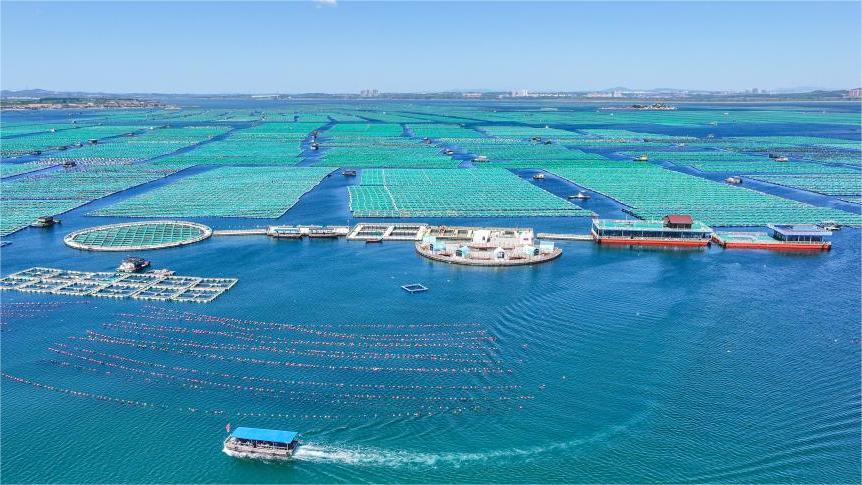Fujian builds diverse food supply system with all-encompassing approach to food
Fujian province, located on the southeast coast of China, has a per capita arable land area of only a quarter of the national average. In the 1980s, there was an overall shortage of food, with limited varieties. The types of meat, aquatic products, fruits and vegetables were relatively few, with low yields. Every year, the province had to source large amounts of grain and vegetables from other provinces.
To solve the problem of food scarcity, it's not enough to focus only on the existing arable land. Instead, an all-encompassing approach to food must be adopted to build a diversified food supply system, and develop food sources in multiple ways.

Photo shows a breeding base of big yellow croakers in Baiji Bay, Jiaocheng district, Ningde of southeast China's Fujian province. (People's Daily Online/Wang Wangwang)
The all-encompassing approach to food was raised by Chinese President Xi Jinping when he worked in Fujian province. Xi proposed to "attach as much importance to sea areas as to cultivated land, and as much to marine development as to food production, so as to extend the tentacles of speeding up economic development from land to sea." He proposed the "Fuzhou at Sea" and "Fujian at Sea" initiatives to seek economic development from the sea.
Over the past 30 years, Fujian has earnestly implemented the all-encompassing approach to food, harnessing its abundant natural resources found in mountains and seas to create a diverse food supply system tailored to its unique geographical advantages.
This approach has yielded remarkable results. The province overfulfills grain production tasks assigned by the central government every year. The output of livestock and poultry has seen a significant increase, with the total meat production reaching 3.11 million tons last year, a 250 percent increase compared to early 1990s. In particular, poultry production surged by 13 times.
The per capita share of aquatic food in Fujian province stands at over 200 kilograms, one of the highest across China. The province is also one of the leaders in the total output of commercial edible fungi, cultivating over 30 varieties.
The annual tea production in Fujian has grown from 50,000 tons in late 1980s to 500,000 tons today, with both total output value and per unit yield ranking among the highest in the country. Furthermore, Fujian has become a major source of vegetables, playing a significant role in a "south-to-north vegetable transporting" initiative.
In Huanxi township, Jin'an district, Fuzhou, Fujian province, a demonstration base for high-quality specialty products has been established, covering over 1,000 mu (66.7 hectares). The township has constantly improved field facilities, collaborated with the Fuzhou Vegetable Science Research Institute to breed superior varieties, and signed long-term supply agreements with e-commerce platforms under the promotion by relevant state-owned enterprises.
As a result, trucks of online grocery platforms are always seen heading to the fields of the demonstration base, and previously undervalued agricultural products due to logistical challenges and low recognition are now selling well in the market.

A farmer checks on the growth of rice seedlings in an intelligent sprout cultivation center in Honglai township, Nan'an, southeast China's Fujian province. (People's Daily Online/Zhang Jiuqiang)
In Yaoxia village, Hetian township, Changting county, Longyan of Fujian province, agroforestry is thriving. A prime example is villager Zeng Xianfu, who grows milkwort, a type of medicinal herb, and raises Hetian chickens, a local breed, under broad-leaved forest, and his agritainment business is also flourishing.
By adeptly pairing the milkwort with Hetian chicken - two "treasures from under the forest" - in an herbal chicken dish, he has created a hot-selling product that is in high demand on e-commerce platforms.
In Baiji Bay, Sandu'ao, Jiaocheng district, Ningde of Fujian province, there are over 80 new-type plastic deep-water net cages. "The deep-water net cages have strong resistance to wind and waves, and provide more space. Our company's annual production of large yellow croaker has increased from 6,500 tons to 8,500 tons," said Song Xiangguo, head of an offshore aquaculture base of a local food company.
Fujian province is making efforts to cultivate featured advantageous industries and diversify food sources to construct a high-quality agricultural product supply system. Apart from focusing on land and offshore areas, the province is also expanding into the deep sea.
On May 7, the waters around Dinghai Bay in Lianjiang county, Fuzhou, were calm and serene. Stepping onto the "Dinghai Bay No. 2" aquaculture platform felt like walking on solid ground.
"The platform measures 60.9 meters long and 32 meters wide, capable of accommodating 200,000 high-quality adult fish with an annual production capacity exceeding 500 tons," said Lu Tongfeng, general manager of Fujian Xinmao Fishery Development Co., Ltd.
In the deep-sea waters, there is an abundance of algae and plankton species, providing larger living spaces and enhancing the quality of the fish, Lu added.

Workers dry tea leaves in Xiaoyue village, Qianqi township, Fuding, southeast China's Fujian province, March 26, 2024. (People's Daily Online/Wang Wangwang)
In recent years, Fujian province has implemented multiple measures to develop marine ranches and strengthen its distant-water fishing industry. Currently, Fujian owns over 630 distant-water fishing vessels, ranking among the top in comprehensive strength nationwide.
Strengthening the role of enterprises and striving for breakthroughs in core seed sources, Fujian is advancing agricultural modernization with scientific innovation.
One example is Fujian Sunner Group, located in Guangze county, Nanping of Fujian province. The company has implemented advanced technologies in their poultry farming operations, such as an automated water supply system to ensure clean and hygienic water at all times, and an intelligent feeding system that automatically dispenses feed based on the remaining amount in the tray. Sensors placed throughout the chicken houses continuously collect data on temperature, humidity, and air quality, which is displayed in real-time on a large screen in the group's headquarters.
The system monitors data from 316 farms and 3,688 chicken houses, and if any indicators exceed the set range, an automatic alarm is triggered. Through these methods, 180,000 chicks are being carefully taken care of.
Since 2011, Fujian Sunner Group has invested over 1 billion yuan ($138.17 million) in its white-feathered chicken breeding project. In December 2021, the company's self-developed white-feathered chicken breed "Shengze 901" obtained full intellectual property rights and was approved by the Ministry of Agriculture and Rural Affairs, breaking China's dependence on imported white-feathered chickens.
Through continuous breeding efforts, the comprehensive performance of "Shengze 901" has reached international advanced levels, with a domestic market share of over 20 percent.
Fujian province has also actively implemented initiatives to revitalize the seed industry. Since 2021, it has developed 123 new agricultural varieties. Over 98.5 percent of farmlands in the province are grown with fine breeds.
Photos
Related Stories
- Fujian's innovations lead nation's quest for food security
- Chinese mainland to resume tourism for Fujian residents to visit Matsu
- Tea industry in Fujian prospers through diversified development
- Luminous waves captivate visitors in SE China's Fujian
- Fujian eyes high-quality growth driven by new quality productive forces
Copyright © 2024 People's Daily Online. All Rights Reserved.









